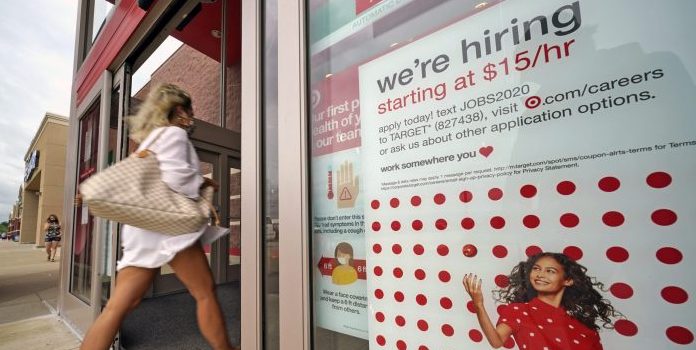(Headline USA) The U.S. unemployment rate fell sharply in August to 8.4% from 10.2%.
Employers added 1.4 million jobs, the Labor Department said, down from 1.7 million in July. The U.S. economy has recovered about half the 22 million jobs lost to the pandemic.
Governors — mostly Democrats — are still keeping many sectors of their economies shut down or severely limited, blaming the coronavirus.
From small businesses to hotels, restaurants, airlines and entertainment venues, a wide spectrum of companies are struggling to survive the loss of customers, after an epic collapse in the spring.
Many economists think significant hiring may be hard to sustain because employers are operating under a cloud of uncertainty about the virus.
Friday’s jobs data was the second-to-last employment report — for most voters, the most visible barometer of the economy — before Election Day, Nov. 3. President Donald Trump faces the daunting task of seeking re-election in the worst economic downturn since the 1930s. Yet voters in surveys have generally given him higher marks on the economy than they have on other aspects of his presidency.
The jobs report coincides with growing signs that more companies are making permanent job cuts rather than temporary furloughs, as decisions made by state political leaders have driven many small businesses into bankruptcy. That trend could keep the unemployment rate persistently high.
Casino and hotel operator MGM Resorts, slammed by declines in travel and tourism, said last week that it’s eliminating 18,000 jobs. Coca Cola, which derives half its sales from stadiums, theaters and other venues that have been largely shut down, is offering buyouts to 4,000 employees. Salesforce said it is cutting 1,000 jobs. Bed, Bath & Beyond will shed 2,800.
A Federal Reserve report this week based on anecdotal reports from businesses found “rising instances of furloughed workers being laid off permanently as demand remained soft.”
Roughly 29 million Americans are receiving state unemployment aid, although their total benefits, on average, have shrunk by more than half since the expiration of a $600-a-week federal supplement more than a month ago. The Trump administration has set up a program that will provide some of the unemployed with $300 a week.
The economy appears to be operating on two tracks, resulting in an uneven and unequal recovery. Manufacturers are enjoying a solid rebound in demand for cars, appliances and electronics, with factory orders nearly back to pre-pandemic levels.
Home sales are also booming. So are home prices. Sales of existing homes surged by the most on record in July and are now nearly 9% higher than a year ago.
Adapted from reporting by Associated Press.

